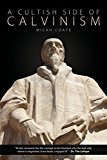A Cultish Side of Calvinism. By Micah Coate. NP: Innovo Publishing, 2011. 330 pp. Paperback, $19.95.
This book has an all-star lineup of endorsers including well-known Evangelicals Tim LaHaye, Earl Radmacher, Paige Patterson, and Jerry Vines. In addition to Radmacher, several other Free Grace leaders endorse the book: Charlie Bing, Dave Anderson, Fred Chay, Gordon Olson, and George Bryson.
The weaknesses of this book (which are outweighed by its strengths) are: a lack of logical organization and progression, the extreme length of each chapter (there are only four chapters in a 300+ page book), too much reliance on the critiques of Calvinism by other authors (for example, he cites Vance on 40 pages, Geisler on 29 pages, Bryson on 26 pages, and Hunt on 20 pages), and a failure to point out how modern Calvinism departs from Calvin on many points, such as the nature of saving faith, unlimited atonement, and assurance being of the essence of saving faith. Most disappointingly, though it can clearly be deduced that Coate believes in Free Grace, he fails to clearly present the message of everlasting life anywhere in the book.
One statement in the opening paragraph of the first chapter raised a red flag, “As we examine Calvinism, we must develop a standard by which it is appraised in order to determine with some accuracy whether or not it measures up to what I call historical Christian orthodoxy according to sound biblical exposition” (p. 23, italics his). I was struck by the two measures of orthodoxy Coate applies: history and Scripture. Why does he include historical Christian orthodoxy? Calvinism is more orthodox historically than Free Grace. Isn’t the only measure of Biblical orthodoxy Scripture itself?
The strengths of this work are its striking title, good footnotes and bibliography, excellent points made about each of the five points (in Chap. 2), and the evidence he cites that Calvin’s leadership in Geneva was cultish. The book also draws a strong connection between the exegetical practices of Calvinism and those of cults like Mormonism and Jehovah’s Witnesses in the section “Its Twisting of Scripture” (pp. 211-25). Coate begins the section with a quote from Norman Geisler and Ron Rhodes that says: “The fact is, the cults are notorious Scripturetwisters. When dealing with the cults, one must keep in mind that they are always built not upon what the Bible teaches but upon what the founders or leaders of the respective cults say the Bible teaches” (Geisler, Norman L., and Ron Rhodes. Correcting the Cults: Expert Responses to Their Scripture Twisting. [Grand Rapids: Baker Books, 1997], p. 18. Quoted on p. 211). Coate then effectively shows that this is exactly what the Calvinists also do, giving examples from the Reformation Study Bible and other popular Calvinist sources.
I found the section “Calvinism’s Misrepresentation of God” (pp. 293-300) to be particularly hard-hitting and effective. In it he wrote, “When I encounter or read about people who are anti-God, I often find that their view of God is Calvinistically distorted” (pp. 293-94), and after quoting a popular rock star’s (James Keenan’s) cursing of Jesus, where he called Jesus a liar for claiming He would die for him, goes on to say, “I find it very ironic that Christians abhor these lyrics while seeming not to care that Sproul, White, Piper, and other leading Calvinists not only preach the same message (sparing the curse words) but also cloak it in scriptural quasi-truths presented as ‘pure biblical Christianity.’ That a Christian with any admiration for Calvinism might think James Keenan’s lyrics are wrong is inconsistent” (pp. 294-95).
When reading this I remembered attending a debate at the University of North Texas where a prominent atheist professor debated an apologist from a local church concerning the existence of God. The atheist professor stated that his hostility was not toward the idea of God in general, but toward the God of Calvinism. He spent the entire debate arguing, not against God’s existence per se, but against various Calvinistic doctrines. The trend in atheistic apologetics is to argue against God from a moral standpoint rather than a scientific one, and these arguments are often aimed at Calvinism’s distorted view of God rather than the God of the Bible. Restoring a Biblical view of God will largely do away with these arguments.
While it is unlikely that this book would shake up a 5-point Calvinist, it could help someone confronted by Calvinism to see its cultish side, and it could spur Free Grace believers to be diligent in addressing the errors of Calvinism.
I recommend this book.
Grant Hawley
Pastor
Grace Bible Church
Allen, Texas

